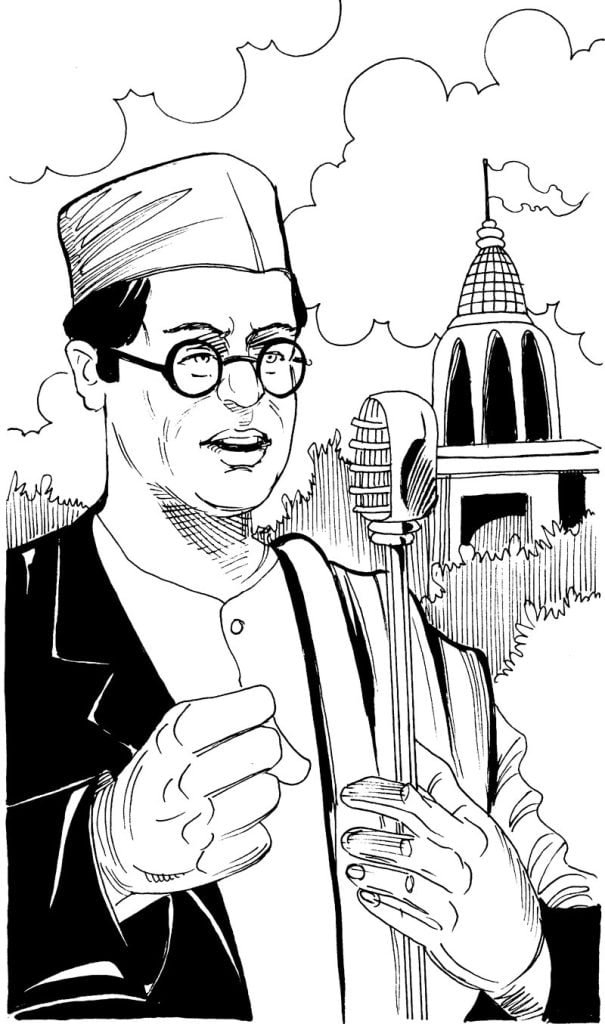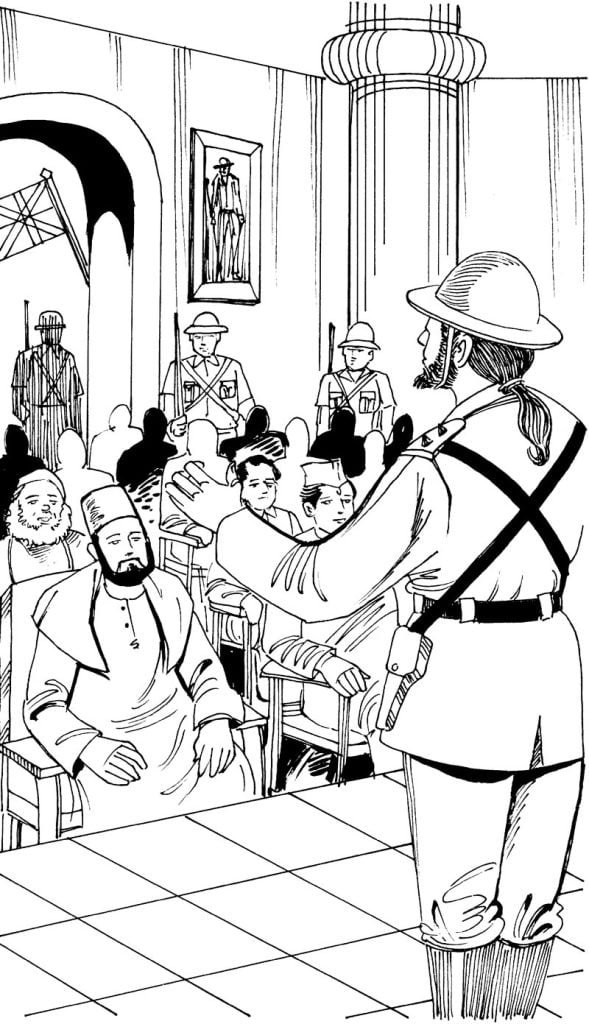In March, 1925 Vinayak Savarkar went to Shirgaon to meet Dr. Hedgewar who had founded Rashtriya Swayam Sevak Sangh (RSS) to strengthen Hindu society, the same aim as Savarkar had. They had a long talk on Hindutva agenda and agreed at the necessity to spread the agenda countrywide.
That was the time when Hindu society suffered from self propagated disabilities. The practice of untouchability was rampant. In schools untouchable children were made to sit away from the rest of the children. It was so in Ratnagiri schools. Savarkar protested vehemently against this practice. He met the parents of the children. He tried his best to fight against the evils of the Hindu society.
In a Hindu meeting at Ratnagiri he pleaded, “Hindu brothers, we rear dogs as pets in our homes. We eat food sitting by the side of our dogs. But we refuse to sit with humans we call untouchable. When untouchables convert to other religions we started treating them with respect. We don’t respect them as long as they are in our own religion. We consider them untouchables. Why do we run away from them? It is all confusion and delusion of mind. The reality is that whoever is in our religion he is pious. No one is untouchable. All the Hindus irrespective of caste as brothers to each other. We must treat them as fellow human beings as good as any.”
During the Ganesh festival of Maharashtra, at one place, Savarkar organised a meeting of Hindus who were engaged in festivities to put across his message—“the Englishman is worse than a chandal but when he studies or recites Vedas you respect him without any reservation. That is no good. Instead you must extend your respect to all Hindus without considering any one untouchable.”
On that occasion Savarkar distributed Vedic books to untouchable brothers. He offered them sacred threads (Janeoo) that orthodox Brahmins considered too sacred for lowly untouchables to wear. He said, “Everyone has right to correct one’s mistakes even if done in previous life because upon it depends our society becoming strong and prosperous. It can not be achieved without correcting the mistakes inducted by caste theories.”
Savarkar was also anguished to see that untouchables were not allowed in the temples. He said that all Hindu temples must be open to all Hindus of all castes. But the temples were under the strict control of orthodox people and orthodox priests who were opposed to any talk of any kind of reform.
In Ratnagiri Savarkar constructed ‘Patit Pavan’ temple which was open to all people especially to untouchables. Savarkar held the view that in the temple of God there was no place for any discrimination.
He was for Hindi to be accepted as National Language to unify the country for achieving the independence. He toured towns and village propagating his reformist agenda.
In 1937 ‘Hindu Mahasabha’ held its convention in Ahmedabad to awaken Hindu consciousness.
Then, he toured Uttar Pradesh. At Kanpur thousands came to hear him.
In Delhi he was taken out in grand procession. A Hindu convention was held in Nagpur on 13th December 1937. He talked on Kashmir and called the Hindus to rally to face anti-Hindu forces in the valley. He appealed to women to come out of domestic confinements to serve the cause of the country. He defined ‘Hindu’ as the one who considered the land from Indus to the Indian Ocean as one’s motherland and sacred soil.
He criticized Mahatma Gandhi saying, “Gandhiji says that without the co-operation of Muslims we can’t win freedom. But I suggest to Muslims that they join us. If they do we shall fight independence war together. If they don’t we shall fight on our own. If they oppose our fight we shall deal with them before taking on the British.”
Then, Second World War began. The Congress refused to cooperate with British in their war effort. Dalit leader, Dr. Bheemrao Ambedkar sided with the British and asked Dalit youth to join army to fight for England’s cause. Vinayak Savarkar also asked the youth to join the army. He wanted the youth to get military training in the process.

After the end of the World War, a new government was installed in England. It favoured granting India freedom after dividing it into two Hindu majority and Muslim majority parts. For the same purpose Stafford Cripps arrived in India.
Savarkar declared to him, “India should not be divided into pieces.”
Gandhiji was also against the division.
But rest of the Congressmen were ready to accept the division idea if it was pre-condition for independence. So, the division process was put in motion. It pained Savarkar.
On 22nd March, 1947 Lord Mountbaton came to India to complete the division process and the grant of independence to India as the last Viceroy of British colonial rule.

Savarkar demanded that Hindu Mahasabha be consulted before any final decision on the division or independence was taken. But the viceroy talked to the Congress leaders and Muslim League leaders only and returned to England.
Savarkar warned the Congressmen, “If the country is divided it will be treachery to the people of India. Everything must be done to avoid the division.” But the Congress was already sold to the division proposal. Lord Mountbaton returned to India and announced the division of India into two parts, India and Pakistan.
The die was cast.
On 15th August, 1947 India was granted freedom. Pakistan became independent one day earlier. Jawahar Lal Nehru became the first Prime Minister of Independent India.
Savarkar said, “For getting freedom I am happy. But the division pains me. Had we won one India through battle I would have been happier. But we must accept the situation. It is no use crying over spilt milk.”
The division of the country followed by communal massacres on both sides. Thousands got brutally murdered. Millions of Hindus and Sikhs fled Pakistan for India. It generated an unprecedented communal hatred on both sides of the divide.
Then, Pakistan invaded Kashmir.
At the time of the division ‘Partition Council’ determined the division of the properties and cash between the two countries. Pakistan got 20% of the properties and 17.5% of the cash. As New Delhi was the capital of British India all the cash was in Indian hands. India was to give Pakistan its share of 65 crore rupees.
Pakistan demanded its share of cash from India. Sardar Patel (Home Minister) was in favour of delaying the payment as he thought Pakistan could use the money for buying arms to create trouble for India.
So, India dilly dallied.
It angered Gandhiji. He wanted the money to be paid to Pakistan without delay as the money legally belonged to Pakistan. Gandhiji was above narrow politics. He was a man of truth and principles.
Some leaders didn’t agree. Savarkar and many other Hindu leaders concurred with them. In their view there was no place for saintly games in hard politics of cruel realities.
The Government showed reluctance in parting with the money. Gandhiji sat on hunger strike demanding immediate payment of the sum to Pakistan. The government had to yield.
It angered many militant elements in India. They saw in Gandhiji an agent of Pakistan.
On 30th January, 1948 Nathu Ram Godse shocked the country by assassinating Gandhiji in New Delhi in the prayer meeting. From a close range he fired thrice at Gandhiji.
The government retaliated by banning RSS as Nathuram Godse had been a member of that organisation for a period before resigning. Thousands of RSS workers were put in jail.
‘Hindu Mahasabha’ also could not escape the attention of the vindictive government.
Savarkar was also arrested on 5th June, 1947 on the basis of circumstantial evidence although Savarkar was not directly connected to the murder conspiracy.
Godse was admirer of Vinayak Savarkar and had met him on a few occasion. He used to call Savarkar ‘Guruji’ out of respect for him. Savarkar had extended financial help to Godse to keep afloat a magazine he used to run. Their relationship was purely academic. Assassination of Gandhiji was Nathuram Godse’s own idea which he shared with his confidants only.
In the court Savarkar said, “Just as a soldier fights for his country so I have done for the freedom of India. I have undergone lot of torments and miseries for that. For fifty years I have carried on the battle and lost everything that I had. Fortunately I survived to see India free. I never tried to eliminate any ruler physically. I openly criticize the people whose policies I don’t like. Nehru and Gandhi’s policies are prominent among them. I have been implicated merely on the basis of my frank criticism. Nehru thinks that I am the main culprit in this case. The fact is that I had nothing to do in this murder.”
Later, the court acquitted Vinayak Savarkar. When he reached Bombay from Delhi (the case was tried in Delhi). Savarkar’s followers gave him a rousing reception.
